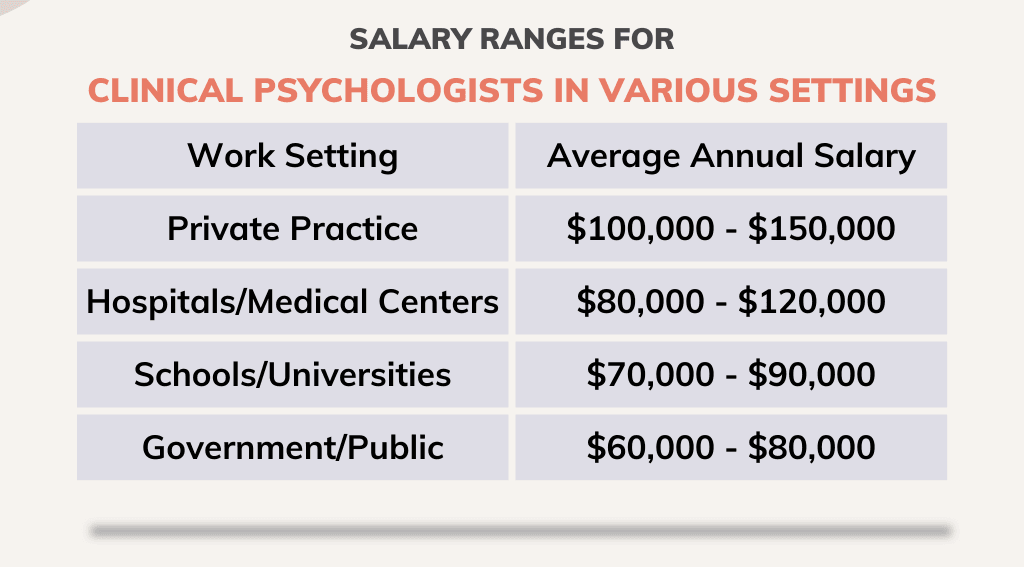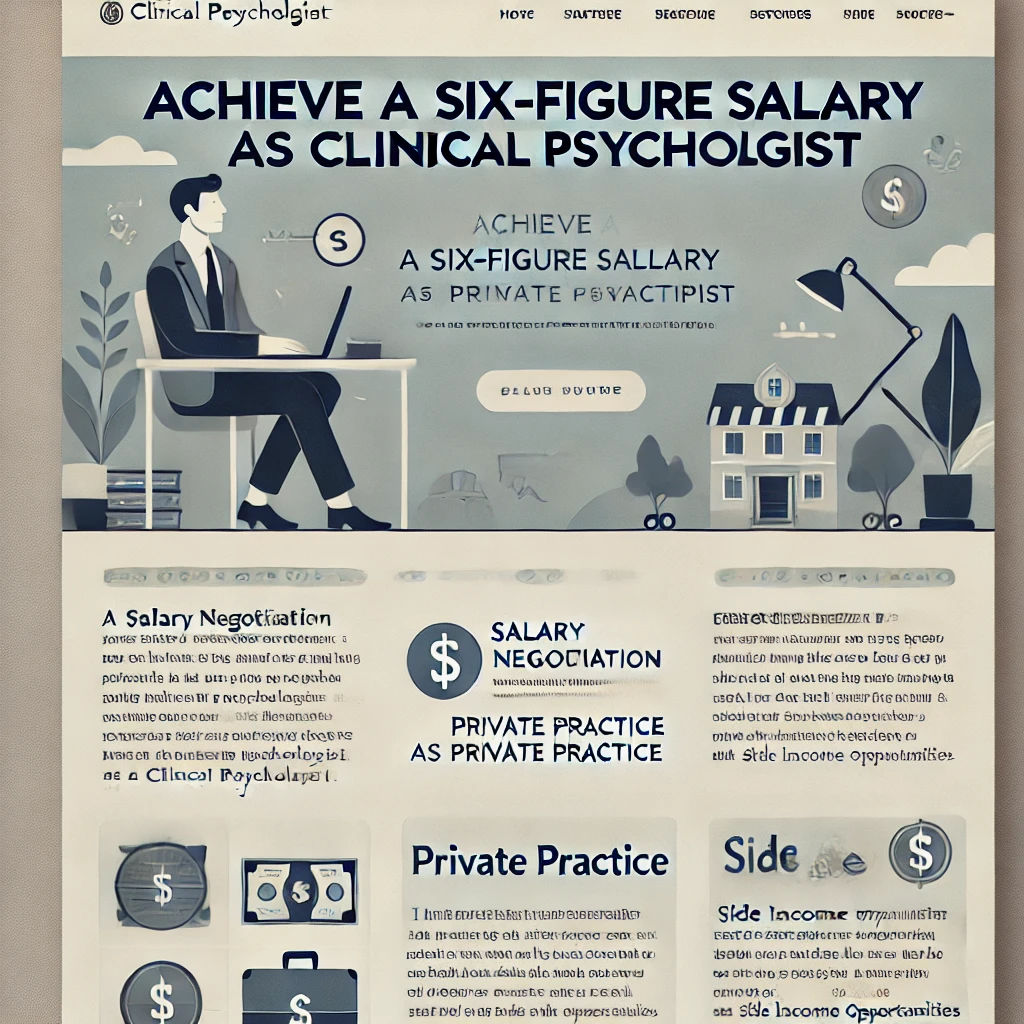Do you wonder how experience, location, and work setting affect your clinical psychologist salary? Your expertise is highly valued as a clinical psychologist, but how does the clinical psychologist’s salary affect your financial stability and career trajectory? Many factors influence the earning potential of professionals in this field, including geographic location, work setting, and years of experience. Understanding how a clinical psychologist’s salary affects your career can help you make informed decisions that maximize your earning potential, whether you’re just starting out or looking to increase your salary in the future.

Why Clinical Psychologists Face Salary Disparities
Clinical psychologists, though highly educated and skilled, often encounter wage gaps that vary depending on the following factors:
- Geographic location: Psychologists in states like California and New York tend to earn more due to the higher cost of living. In contrast, those in rural or less populated states may see lower salaries.
- Work setting: Private practices often offer the potential for higher income than public institutions, where pay scales can be rigid.
- Experience: Early-career psychologists typically start with lower salaries, while seasoned professionals can command higher wages through their expertise and reputation.
Understanding these disparities is key to positioning yourself for better opportunities. Now, let’s explore how you can maximize your salary.

How to Maximize Your Clinical Psychologist Salary
You can adopt several strategies to increase your earnings as a clinical psychologist. Whether negotiating your current salary, seeking higher-paying roles, or diversifying your income streams, there’s no shortage of ways to boost your income.
1. Negotiate Your Salary Effectively
One of the easiest ways to increase your salary is through negotiation. Many psychologists, particularly those new to the profession, may feel uncomfortable discussing money. However, negotiating your salary is a critical skill that can significantly impact your earnings.
Here are some tips for negotiating effectively:
- Do your research: Know the average salary and experience level of clinical psychologists in your area. Sites like the Bureau of Labor Statistics (BLS) can provide accurate data.
- Highlight your value: Be prepared to explain how your skills, experience, and results contribute to your employer’s success.
- Be confident but reasonable: Based on your research, set a salary range and be willing to negotiate within that range.
Discover comprehensive salary negotiation strategies tailored to healthcare professionals.
2. Seek Out High-Paying Specializations
Certain specializations within clinical psychology tend to offer higher pay. For example, forensic psychology, neuropsychology, and child psychology often come with better compensation than general practice.
- Due to the specialized nature of their work, forensic psychologists who work within the legal system typically earn more.
- Neuropsychologists focus on brain injuries and neurological conditions, making their services highly sought after in clinical and research settings.
- Child psychologists who work with schools, hospitals, or private practice may also see higher earnings, particularly if they focus on high-demand areas such as autism spectrum disorders or learning disabilities.
By choosing a lucrative specialization, you can significantly increase your earning potential.
3. Consider Private Practice
Private practice can be a game-changer when it comes to income. While starting your own practice requires an upfront investment of time and money, the payoff can be substantial. Many clinical psychologists who run private practices earn well into the six-figure range.
Key benefits of private practice include:
- Autonomy: You control your workload, client base, and hours, allowing you to maximize your earning potential.
- Scalability: Once established, private practices offer opportunities for expansion through hiring additional staff or renting out office space to other professionals.
- Higher fees: Private practice psychologists can charge more per session compared to public settings.
4. Supplement Your Income with Consulting or Side Work
Another way to reach a six-figure salary is by supplementing your income with side work. Clinical psychologists take on consulting roles, expert witness testimony, or public speaking engagements.
- Consulting: As a clinical psychologist, you can offer your expertise to schools, corporations, or other healthcare providers.
- Public speaking: Sharing your knowledge at conferences, seminars, or workshops can also provide an additional revenue stream.
- Online therapy: With the rise of telehealth platforms, many psychologists offer remote therapy sessions, allowing them to take on more clients without the overhead costs of an office.
Diversifying your income streams increases earnings and protects against potential financial instability.

Salary Ranges for Clinical Psychologists in Different Settings
Let’s take a closer look at the average salary ranges for clinical psychologists in various settings:
- Private Practice: Clinical psychologists in private practice typically earn between $100,000 and $150,000 annually, depending on location and client load.
- Hospitals/Medical Centers: Psychologists working in hospitals generally earn between $80,000 and $120,000 per year.
- Schools/Universities: Those employed in educational settings usually earn around $70,000 to $90,000 annually.
- Government/Public Institutions: Salaries in public settings, such as VA hospitals or state-run clinics, tend to be lower, with an average of $60,000 to $80,000 annually.
These ranges highlight how a clinical psychologist’s salary effect can significantly increase your income by choosing a higher-paying work setting or taking on side work.
Salary by State: Where Do Clinical Psychologists Earn the Most?
According to the Bureau of Labor Statistics, clinical psychologists in certain states earn higher-than-average salaries. Here are the top-paying states:
- California: $125,000
- New York: $110,000
- Massachusetts: $105,000
- Texas: $100,000
- Florida: $98,000
If you’re open to relocating, moving to a state with a higher cost of living but better pay might be a viable option.
Factors That Impact Clinical Psychologist Salaries
Several factors can influence your earning potential as a clinical psychologist:
- Education level: Those with doctoral degrees typically earn more than those with master’s degrees.
- Experience: As with most professions, the more experience you have, the higher your salary.
- Geography: Urban areas offer higher salaries than rural areas, though the cost of living is often higher.
- Specialization: Psychologists who specialize in high-demand areas can command higher fees.
Understanding these factors and strategically positioning yourself within the job market can increase earning potential.

Actionable Steps to Achieve a Six-Figure Salary as a Clinical Psychologist
By now, you should have a clearer idea of how to maximize your salary as a clinical psychologist. Let’s summarize the key steps you can take to achieve a six-figure salary:
- Negotiate your salary: Don’t shy away from discussing your compensation.
- Choose a lucrative specialization: Specialize in neuropsychology, forensic psychology, or child psychology.
- Consider private practice: Starting your own practice can significantly increase your income.
- Diversify your income: Take on side work like consulting, online therapy, or public speaking to supplement your earnings.
- Relocate to a higher-paying state: If feasible, consider moving to a state with a higher average salary for clinical psychologists.
By following these steps, you can work towards a six-figure salary while continuing to impact your clients’ lives positively.
Salary Ranges for Clinical Psychologists in Various Settings

FAQ Section:
Q: What are the main factors that affect a clinical psychologist’s salary?
A: Key factors include geographic location, work setting, years of experience, and specialization.
Q: Can I increase my salary as a clinical psychologist without changing jobs?
A: Yes, by negotiating your salary, specializing in higher-paying fields like neuropsychology, or starting a private practice.
Q: Which states offer the highest salaries for clinical psychologists?
A: States like California, New York, and Massachusetts offer higher salaries due to higher living costs and demand.
Q: What is the earning potential for clinical psychologists in private practice?
A: Clinical psychologists in private practice can earn between $100,000 and $150,000 annually, depending on location and client load.
Maximizing Your Clinical Psychologist Salary: Key Takeaways
In conclusion, a clinical psychologist’s salary effect is shaped by several key factors, from your location and experience to your chosen work setting. By understanding these variables and applying strategies to enhance your career, such as specializing in high-demand areas or negotiating for better pay, you can significantly boost your income. Embracing these steps will help you achieve a rewarding career, personally and financially, and ensure your earnings reflect your expertise and hard work.







